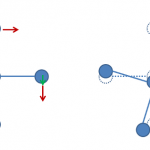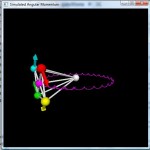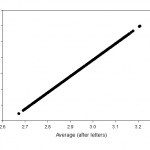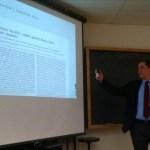
A couple of years ago, we got a nasty shock when my 98-year-old great-aunt died unexpectedly. It's happened again, with her sister Ethel (known to a lot of the family as "Auntie Sis," because she had the same first name as her mother, my great-grandmother), who died in her sleep last Sunday night. She would've celebrated her hundredth birthday this fall.
You might not think the peaceful death of a 99-year-old would count as a nasty shock, but again, she was a remarkable woman. She still lived by herself in a great big house, and still took care of the place herself, and drove herself…
A few years ago, I taught one of our "SRS" classes, which are supposed to introduce students to research at the college level-- I blogged about it while the course was in progress. I taught it again in the recently-concluded Winter term, but didn't blog much about it because I was mostly doing the same stuff as last time. I did re-adjust the content a little, as I've changed some things about the way I like to present stuff since 2012, but they were mostly cosmetic tweaks, with one big exception.
In the previous round, I went with the base course description, which just specifies that…
Everybody and their extended families has been sharing around the Fareed Zakaria piece on liberal education. This, as you might imagine, is relevant to my interests. So I wrote up a response over at Forbes.
The basic argument of the response is the same thing I've been relentlessly flogging around here for a few years: that while I'm all for a broad education, the notion that studying a STEM subject and studying "the human condition" are in opposition or even cleanly separable is just foolish. But it's a great excuse to start that argument at Forbes, so...
I hinted once or twice that I had news coming, and this is it: I've signed up to be a blog contributor at Forbes writing about, well, the sorts of things I usually write about. I'm pretty excited about the chance to connect with a new audience; the fact that they're paying me doesn't hurt, either...
The above link goes to my contributor page there, which will be your one-stop-shopping source for what I write at Forbes. There are two posts up this morning, a self-introduction, and an attempt to define physics and what makes it unique. The "Follow" button has an option for an RSS feed; this isn…
All the way back in 2001, I got started on the whole blog thing by beginning a book log. That's long since fallen by the wayside, but every now and then, I do read stuff that I feel a need to write something about, and, hey, the tagline up at the top of the page does promise pop culture to go with the physics...
I've actually been on a pretty good roll with fantasy novels over the last few months, hitting a bunch of books that I've really enjoyed, without any real duds. I was actually pleasantly surprised by the first of these, Django Wexler's The Thousand Names. This got good reviews, but it…
That's the title of the talk I gave yesterday at Vanderbilt, and here are the slides:
Talking Dogs and Galileian Blogs: Social Media for Communicating Science from Chad Orzel
The central idea is the same as in past versions of the talk-- stealing Robert Krulwich's joke contrasting the publication styles of Newton and Galileo to argue that scientists spend too much time writing technical articles aimed at an audience of other experts, and need to do more "Galileian" publication aimed at a broad audience. And that social media technologies offer powerful tools that can enable those who are…
I mentioned last week that I'm giving a talk at Vanderbilt tomorrow, but as they went to the trouble of writing a press release, the least I can do is share it:
It’s clear that this year’s Forman lecturer at Vanderbilt University, Chad Orzel, will talk about physics to almost anyone.
After all, two of his popular science books are How to Teach Physics to Your Dog and How to Teach Relativity to Your Dog. Orzel, an associate professor of physics at Union College in New York and author of the ScienceBlog “Uncertain Principles,” is scheduled to speak on campus at 3 p.m. Thursday, March 26.
As…
Yesterday's post about VPython simulation of the famous bicycle wheel demo showed that you can get the precession and nutation from a simulation that only includes forces. But this is still kind of mysterious, from the standpoint of basic physics intuition. Specifically, it's sort of hard to see how any of this produces a force up and to the left, as required for the precession to happen.
I spent a bunch of time last night drawing pictures and writing equations, and I think I have the start of an explanation. It all comes down to the picture of rigid objects as really stiff springs-- the grey…
The third of the great physics principles introduced in our introductory mechanics courses is the conservation of angular momentum, or the Angular Momentum Principle in the language of the Matter and Interactions curriculum we use. This tends to be one of the hardest topics to introduce, in no small part because it's the last thing introduced and we're usually really short on time, but also because it's really weird. Angular momentum is very different than linear momentum, and involves all sorts of vector products and things going off at right angles.
This leads to some of the coolest demos…
We'll be accepting applications for The Schrödinger Sessions workshop at JQI through tomorrow. We already have 80-plus applicants for fewer than 20 planned spots, including a couple of authors I really, really like and some folks who have won awards, etc., so we're going to have our work cut out for us picking the attendees...
We're also discussing the program for the workshop-- more details when we have something more final-- which has me thinking about good examples to use of storytelling involving quantum physics. I'd like to be able to give a few shout-outs to already-existing fiction…
Yesterday's quick rant had the slightly clickbait-y title "GPAs are Idiotic," because, well, I'm trying to get people to read the blog, y'know. It's a little hyperbolic, though, and wasn't founded in anything but a vague intuition that the crude digitization step involved in going from numerical course averages to letter grades then back to multi-digit GPA on a four-point scale is a silly addition to the grading process.
But, you know, that's not really scientific, and I have access to sophisticated computing technology, so we can simulate the problematic process, and see just how much…
I was thinking about something only tangentially related to grading, when it struck me that the way we go about generating student grade point averages is the kind of mind-bogglingly stupid system that requires lots of smart people working together to produce. Two very different groups of smart people, with very different ways of looking at the world.
As a scientist, the starting point for assigning grades is generally a set of scores on a bunch of individual assessments. These are generally combined to form some sort of weighted average, which can be expressed as something like a percentage…
I keep forgetting to mention these, but I have two talks coming up:
1) Tonight, March 17, I'm talking about Eureka to the Mid-Hudson Astronomical Association on the campus of SUNY New Paltz. This is a version of the talk I gave in Bristol, UK over the summer, but with the soccer content replaced with American football.
2) Next Thursday, March 26, I'll be giving a Forman Lecture as part of the Vanderbilt University Physics Colloquium (following in Rhett's footsteps...). This is going to be a revised version of the social-media talk I've given in the past. I need to blow that up and put it back…
It's always a pleasure to see former students doing well, and to that end, we invited one of my former thesis students, Mike Mastroianni, class of 2007, to give a colloquium talk last week in the department. Mike went to physics grad school for a couple of years after graduation, but decided he was more interested in education issues, and is now in the process of writing his dissertation (to be defended in a few weeks) in a Curriculum and Instruction program at the University at Albany.
He gave a really interesting talk on his thesis work, looking at the evolution of gender ratios in STEM…
One of the things I miss about not being able to follow college basketball these days is that I don't really know enough about the state of the game to understand Mark Titus's columns at Grantland. They're kind of sophomoric, but you know, a little of that is sometimes good, and I always enjoyed reading his stuff (I also enjoyed his book). But his columns are so heavily referential as to be basically incomprehensible unless you watch a lot of games.
I still follow him on Twitter, though, and was a little surprised when he tweeted out a link to a Reddit AMA where he talked about struggling…
It's the absolute peak of college basketball season, and it still seems weird to be almost completely disconnected from the game. This is not, by the way, the result of any principled objection to the manifest hypocrisies of the NCAA, or anything like that, but a practical effect of having kids. If the tv is on, it's either showing one of their cartoon shows or drowned out by the pleading for cartoon shows. And by the time they're asleep at night, I'm generally too wiped out to watch anything.
But as a long-time fan, though, I feel I would be remiss if I didn't say something about what's been…
Sir Terry Pratchett, author of some mind-boggling number of books, mostly the comic-fantasy Discworld series, died yesterday. He had been diagnosed with a kind of early-onset Alzheimer's back in 2007, a particularly cruel fate for a writer, but faced it with an impressive degree of grace, and kept writing almost to the end. And, indeed, somewhat past it.
His work was a great comfort to me in some past bad times-- see this book review from 2001-- so his passing hits harder than for a lot of other authors. Not quite sure what to read to get past that...
(Actually, that's not entirely true; I…
It's winter, and as usually happens in winter, I'm having a hard time opening the gate to our back yard. Why? It's not the snow, it's physics.
We have a standing policy that as much as possible, Emmy goes in and out through the back door for walks and small-animal-chasing in the backyard. This has occasionally been lifted, when a tree limb fell on our back gate, and when they were building the deck, but for the most part, when we had to go in and out through the front door, but she mostly knows not to go charging out the front door, which is the whole point.
Access to our fenced back yard is…
Kate's a big consumer of audio books, but I've never been able to listen to them. About five minutes in, I doze right off, every time. However, I know there are a lot of folks like Kate who love audio books and listen to them while commuting, so I'm very happy to announce that Audible is now selling an audio edition of Eureka.
This is the first of my books to get an audio edition, which is cool-- we actually sold audio rights to the first one, but I guess after they paid for it, they discovered that it has a whole bunch of pictures that are kind of integral to the book. At least, I'm guessing…
Today is my grandmother's 90th birthday: born on this date in 1925 in the Bronx, the seventh of eight kids. She moved out to Long Island circa WWII, and has lived there ever since. Many of my favorite childhood memories involve visiting her in Mineola. Back in the 70's, she used to host me and two of my cousins (one a couple years older than me, the other a year or two younger) for a week or so in the summer, to give our parents a break; as a parent of two kids about the age we were at that time, I find this kind of incredible now...
Anyway, she's still going strong at 90, and recently…






